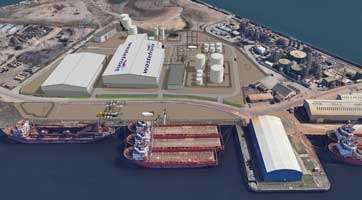 Norwegian tyre recycling company Wastefront has announced a strategic partnership with Dutch energy storage infrastructure provider VTTI. The deal will see Wastefront receive up to US$43 million investment which will be pumped into the first phase of Wastefront’s Sunderland, UK, recycling plant and an agreement to reach a final investment decision (FID) for eight global sites within a five-year period.
Norwegian tyre recycling company Wastefront has announced a strategic partnership with Dutch energy storage infrastructure provider VTTI. The deal will see Wastefront receive up to US$43 million investment which will be pumped into the first phase of Wastefront’s Sunderland, UK, recycling plant and an agreement to reach a final investment decision (FID) for eight global sites within a five-year period.
VTTI – backed by leading energy and infrastructure players Vitol, IFM Investors and ADNOC – is one of the world’s largest independent energy storage infrastructure providers with key locations around the world. The investment in Wastefront and planned investments in future plants are part of VTTI’s global growth strategy in which circular products are an important pillar, with an ambition to conduct more than 50% of its activities in new and transitional energy sources by 2028.
The partnership between Wastefront and VTTI will take two initial forms: firstly, an investment from VTTI of up to US$43 million in Wastefront, to be used in the construction of the first phase of Wastefront’s plant in Sunderland. Wastefront’s Sunderland tyre recycling plant is a £100 million project, which it plans to be fully operational by 2025.
Secondly, site selection surveys are to be conducted to determine eight jointly owned VTTI-Wastefront plants at which Wastefront’s solution will be implemented, and which will be operated by VTTI. The partnership will enable Wastefront to expedite deployment, utilising VTTI’s industry-leading expertise, existing global footprint, and terminal locations.
Since its founding, Wastefront has developed a Blueprint to solve the disposal of an estimated 31 million tonnes/year of end-of-life-tyres (ELT), representing a major environmental issue. At present, most ELTs worldwide end up either in landfills or incinerated. In contrast, Wastefront offers circularity, and the possibility to chemically recycle ELTs into valuable products.
The strategic partnership with VTTI marks the first time the Wastefront Blueprint is being licensed for global deployment. The Wastefront Blueprint will be implemented at Wastefront’s first plant in the Northeast of England, at the Port of Sunderland, which is starting construction this year and is foreseen to be fully operational in 2026.
Wastefront uses pyrolytic reactors that utilise thermal depolymerisation known as ‘pyrolysis’ to break down a tyre’s materials at elevated temperatures. By sending tyres through these reactors, carbon black is produced, in addition to combustible gas, liquid hydrocarbon (pyrolysis oil), and heat. The carbon black is then washed and milled to upgrade the chemical properties and used as a reinforcement for natural rubber in tyre production, mechanical rubber goods, or as a filler for plastics, under precise formulations defined with customers.
Previously, Wastefront has signed agreements with major industrial entities, such as in 2020 with energy and commodities company Vitol for a 10-year offtake agreement for pyrolysis oil and certain non-liquid products, and in 2022 with French engineering and technology company Technip Energies, as its partner for the FEED and for the Engineering, Procurement and Construction Management (EPCM) of the Sunderland plant.
In May 2023, Wastefront signed an agreement with one of Europe’s largest distributors of products for the rubber industry, Weber & Schaer, for recovered carbon black.
